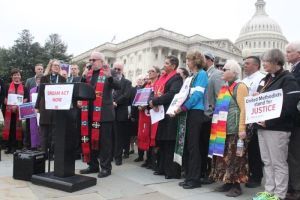Faith-based education and the Sewanee syndrome

One day last spring on the stunning Sewanee campus of the University of the South in Tennessee, I watched with interest as workers deftly chiseled away the words, “Otey Parish” and carved in their place the words “St. Mark & St. Paul.” It was a sign of the times, removing the name of the university’s first Chancellor—a devout churchman, but, alas, a slave owner. The renaming was also a well-intentioned act of reconciliation in the wake of the parish’s segregated history in which African-Americans worshiped as St. Mark’s an
d whites as St. Paul’s-on-the-Mountain.
Given the laudable goal of rectifying past racial inequities, one couldn’t help being struck by the irony of replacing “Otey” with “St. Paul,” who, critics have argued, was an apologist for slavery, instructing slaves to obey their masters, and making no explicit call for liberation when declaring that we are one in Christ, whether slave or free. Although contextually more nuanced (see 1 Timothy 1:10), these Pauline teachings were historically used as biblical support for justifying slavery, likely by Bishop Otey himself.
It’s not only Paul’s slavery-related passages that grate these days. Considering other Pauline teachings, one might wonder why any Christian university with current sensitivities would continue offering a theological curriculum based upon an ancient text that condemns same-sex unions and mandates male spiritual leadership—both now deemed to be on the wrong side of history—and is out of step with prevailing scientific consensus regarding human origins and increasing rejection of binary, biological gender (see Genesis 1:27).
Raising the conundrum for faith-based universities: Jettison the unfashionable parts of Scripture, and inexorably the credibility of the text is so undermined that faith itself becomes problematic, and even the moral foundation for racial and social justice is eroded.
Far from spinning in his grave at his name being expunged, Bishop Otey likely would welcome disassociating his name from trendy theological and moral stances being embraced by many in Christian education, undoubtedly considering those departures spiritually repugnant, and perhaps thinking there’s more than one way to deftly chisel away what’s written in stone.
As the evil of slavery practiced by people of faith highlights the problem, might the culturally-driven, conveniently-rationalized moral lapses of previous generations be mirrored in those of today’s generation? Even yesterday’s oppressed slaves, whether God-fearing or otherwise, would be appalled and mystified at what the church proudly blesses today, dressed up in the sanctimonious robes of diversity and inclusivism.
Sewanee, of course, is not alone in being seduced by the spirit of the age insidiously beguiling faith-based universities—from moral relativism, to political correctness, to a smug, “holier-than-back-then” cancel culture. The Wheatons, Baylors, Pepperdines, and Notre Dames of the academic world—indeed, all Christian schools large and small—are equally at risk of falling prey to the Sewanee syndrome of simplistic generational hubris passing as social justice, and a bewildering ideological mishmash of theological and moral incoherence.
Historically religious universities championing manifestly unbiblical practices alongside just social causes will, in the end, become spiritually irrelevant. Given the historical devolution from faith-based to secular at Oxford, Cambridge, Harvard, and Yale, today’s guardians of Christian education should count it their duty and honor to be on the wrong side of history.
F. LaGard Smith is a retired law school professor (principally at Pepperdine University), and is the author of some 35 books, touching on law, faith, and social issues. He is the compiler and narrator of The Daily Bible (the NIV and NLT arranged in chronological order).




























